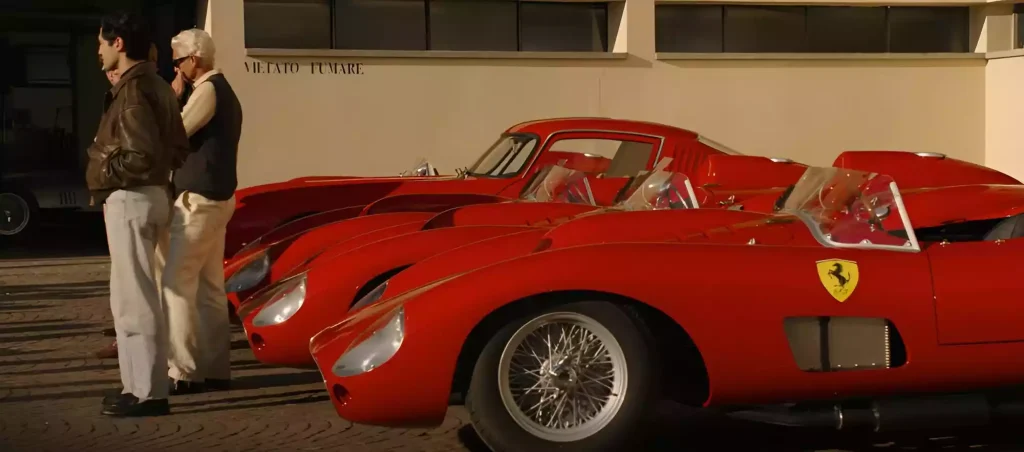Review of the Film “Ferrari”
In 2019, director James Mangold released the film “Ford v Ferrari,” which was titled “Outsiders” in our region. It allowed viewers to delve into the world of cars and racing, a realm that held a unique position in the mid-20th century. “Ford v Ferrari” naturally comes to mind when discussing Michael Mann’s “Ferrari.” However, the emphases in these films are entirely different. Let’s explore how Mann’s new film turned out in our review.
“Ferrari”
- Genre: Biographical drama
- Director: Michael Mann
- Cast: Adam Driver, Penelope Cruz, Shailene Woodley, Gabriel Leone, Sarah Gadon
- Premiere: Cinemas
- Year of release: 2023
- IMDb Website
The film’s plot is based on the biographical book “Enzo Ferrari: The Man, The Cars, The Races, The Machine” by Brock Yates. The story revolves around a challenging period in the life of Enzo Ferrari (Adam Driver). Grieving the death of his son Alfredo and facing problems in his relationship with his wife Laura, Enzo also finds his Ferrari factory on the brink of bankruptcy. His solace comes from his lover Lena (Shailene Woodley) and his illegitimate son Piero. However, Ferrari has no intention of giving up and places his bets on upcoming major races to turn around his business.
At first glance or after reading the plot, it may seem that the film focuses on a specific period in Enzo Ferrari’s life. However, the chosen time frame is just a prism. If you scrutinize it, you’ll find “Ferrari” with an incredibly fragmented editing that chaotically jumps from one scene to another. Because of this, the first half of the film seems to be just gathering momentum, ironically considering the impressive speed of Ferrari cars.

“Ferrari” should be viewed not as a story about events but as a story about people—multiple individuals, as Enzo is merely the focal point of the script. Although he is almost constantly on screen, he does not always play a leading role in individual scenes. This approach makes “Ferrari” more complex, challenging to grasp.
Enzo Ferrari in the film emerges as a complex character who keeps the audience at arm’s length. Adam Driver adds another excellent portrayal to his portfolio, which, however, at some points intertwines too much with his Charlie Barber from “Marriage Story.” Yet, Driver is worth rooting for, establishing himself as one of the most talented actors of the current Hollywood era.
Driver’s talents dim when Penelope Cruz’s character appears on the screen. She seems to be the main star of “Ferrari.” Cruz can convey a whole array of complex emotions with a simple change of gaze. Unable to be categorized into a specific archetype, her portrayal of Laura Ferrari is rich in nuances.
The nuances of car building and the world of speed racing take a back seat to human drama. Mann successfully depicts how personal life infiltrates Enzo’s public image and professional activities. Ridley Scott’s recent “House of Gucci” attempted something similar but did it more straightforwardly, sometimes appearing unsure and naive. “Ferrari” operates with subtler materials, making it more penetrating and sincere.
Nevertheless, cars and races are still present in the film. “Ferrari” does not burden you with all the intricacies of car building of its time. One might think of it as a missed opportunity because the few scenes where Enzo explains complex engineering matters in simple terms turn out to be very appealing. However, the film omits many details, favoring other aspects.
The races in the film essentially amount to just one, serving as the culmination of the entire story where Enzo’s personal struggles and career ambitions collide with the harsh realities of the time. Here, Mann does not spare his audience, leaving a provocative scene for the decisive moment. It sharply stands out against the rest of the runtime, altering the tone of the story instantly. It’s noteworthy that even “Ferrari” found a place for such a moment.
The film portrays the world of racing without gloss, the wealth of people without even a hint of accompanying ease, and racing cars without their characteristic prestige. Yet, the local locations exude exuberance. The impression is that in Italy, it couldn’t be any other way.
“Ferrari” stands out with its unconventional use of musical accompaniment. The musical tracks enter abruptly, almost imposing their presence in many scenes. However, in the end, they create their unique atmosphere. Even the music does not quite resemble standard Hollywood soundtracks. “Ferrari’s” music is more distinctive—much like the film itself.
Conclusion:
“Ferrari” is primarily a film about people, not cars. It shows how intricately everything can be interconnected in the lives of seemingly successful and wealthy individuals. Mann achieves this through his vision and the excellent performances of the local stars, even if at times, you may crave for more.